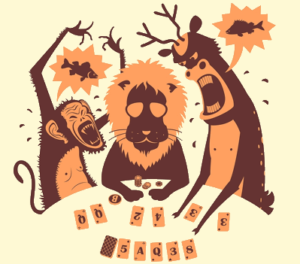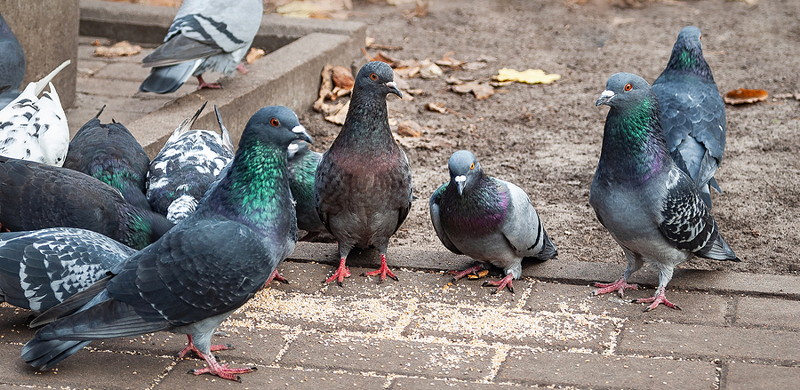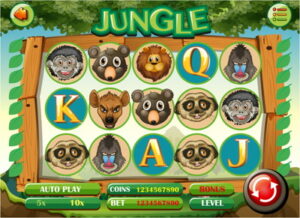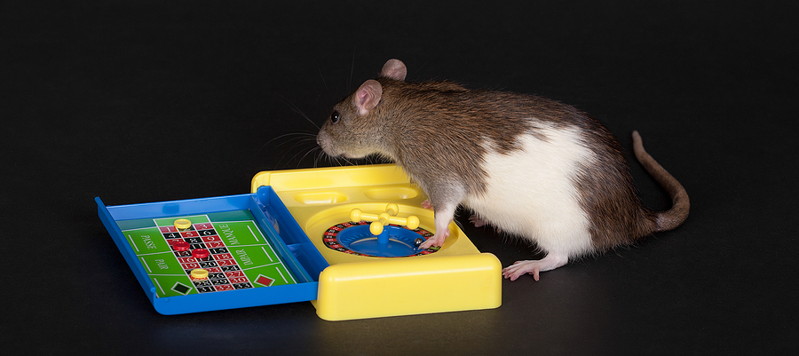 It would be easy to think that humans are the only animal that gamble. Whether this is true or not obviously depends on what it is that you mean by ‘gambling’.
It would be easy to think that humans are the only animal that gamble. Whether this is true or not obviously depends on what it is that you mean by ‘gambling’.
If you’re referring to the notion of spending money on an event in the hope of winning more money, you would obviously be right that it is only humans that have the ability to gamble; after all, no other animal has money that they can use for the purpose. Depending on how it is that you define gambling, many other animals will engage in the process of taking a risk for a reward.
Though one possible outcome of a human’s ability to gamble is that they will get a return that exceeds their investment, we understand that most of the time we are more likely to lose than we are to win. Even so, we’re willing to take the risk because of the potential of a high value outcome if things go our way.
Some animals, it turns out, are willing to take similar such risks, putting something on the line in return for something bigger, even though the likelihood is that they will lose the thing that they’ve already got possession of.
What Is Gambling?
 First and foremost, it is important to outline what it that we mean by ‘gambling’. It is not exactly outrageous for you to think of gambling as being a pursuit involving placing a bet on the outcome of a football match, say, or on the order that playing cards are dealt onto a table.
First and foremost, it is important to outline what it that we mean by ‘gambling’. It is not exactly outrageous for you to think of gambling as being a pursuit involving placing a bet on the outcome of a football match, say, or on the order that playing cards are dealt onto a table.
In reality, that is a refined version of gambling that casino owners and bookmakers have developed in order to take your money away from you in the most straight forward way possible. In actual fact, gambling is about taking a risk for a possible reward.
Imagine you’re in the queue at a supermarket and it isn’t moving very quickly. You see that the one next to you is moving at a more rapid pace, so you decide to take your shopping over to that queue instead. This, believe it or not, is a gamble.
You have taken a risk that you will be served quicker in the other queue, giving up your definite place in one queue for the potential of a different queue altogether. The dictionary offers two definitions of gambling, one of which is ‘a risky action in the hope of a desired result’. Might animals do that?
What We Can Learn From Pigeons

Often referred to as the ‘rats of the sky’, pigeons can tell us quite a lot about the animal world and its desire to gamble. A psychologist at the University of Kentucky called Professor Thomas Zentall carried out some experiments on ‘non human animals’, in this case pigeons.
He gave pigeons two choices, one which presented them with a small selection of food every time they chose it and another that saw them get a larger portion of food about 20% of the time. Once they realised that they might win big, the pigeons started to choose the second option.
According to Zentall, “There’s something at a fundamental level for the attraction to gambling. Some complicated human behaviour may not be as complicated as social scientists have said.”
What he’s saying there is that social scientists have suggested that humans consider themselves to be above the animal kingdom, adding weight and ‘worthiness’ to something that is actually more likely to be an instinctive thing that both humans and animals alike tend to engage in on a regular basis, if pigeons are anything to go by.
Gambling Monkeys
 At Johns Hopkins University in the state of Maryland in the United States of America, research was carried out on monkeys. Scientists trained monkeys how to gamble, going up against a computer in order to win drinks of water.
At Johns Hopkins University in the state of Maryland in the United States of America, research was carried out on monkeys. Scientists trained monkeys how to gamble, going up against a computer in order to win drinks of water.
Both of the rhesus monkeys preferred to take bigger risks that presented them with bigger rewards than smaller risks with smaller rewards. They were offered an 80% chance of three millimetres of water, and a 20% chance of ten millimetres of water, always going for the bigger risk in the hope of getting the greater reward.
Even when they were no longer thirsty, the monkeys still took the bigger gamble. A grad student who was part of the experiment, Xiaomo Chen, said of the monkeys, “They’re like people who like to go to Las Vegas to play the slots, where there’s a very high reward but a very low chance of winning it.”
When scientists suppressed a key area of the monkeys’ brains, they became up to 40% less likely to take a risk. None of the other functions of the monkeys, including their comprehension of tasks, were effected by the alteration.
Research was carried out by other scientists on chimpanzees from the wild and bonobos from the sanctuaries of Congo. One test looked at how long their were willing to wait for a bigger reward even though a smaller one was already available to them. Another asked them to make a choice between a hidden reward that was unseen and a visible one that they were aware of.
The species reacted differently to one another, but there were clear links to how humans behave. The chimps, for example, were willing to wait for a bigger reward, inspire of the potential of losing both.
The bonobos, on the other hand, changed their behaviour depending on their experience and didn’t keep gambling when they were losing their reward. Bonobos, though thought of as being patient animals, were less patient than the more emotional chimpanzees. This has led to some confusion for scientists, who have often thought that human behaviour can be easily clouded by emotions and frustration.
The apes tended to adapt their behaviour depending on where it was that they lived, following regional patterns based on the lived experiences that they’d been through during their times in the different areas.
Strategic Rats

It isn’t just monkeys and pigeons that like to have a gamble. Some experiments were carried out on rats, leading to the conclusion that there were able to behave in a strategic manner when the occasion called for it.
Rats in a laboratory were put in a system that was designed to model the Iowa Gambling Task. That presented humans with four decks of cards and got them to chose one, with two having bigger immediate rewards and disproportionate losses. The sensible decision is to opt for lower penalties and lower rewards, giving you a long term gain.
The rats played against a clock to ‘win’ sugar pellets. How many sugar pellets there were depended on the selection of the rats, ranging from one to four in one of the experiments. They were either given a set reward or a time out, with larger pellets being associated with either longer time outs or more frequent ones.
The rats avoided the option that had the larger reward, demonstrating that they could learn to play the odds. Their behaviour could be changed using drugs, telling the scientists that the choices that they made were linked to a chemical imbalance, which is also suspected in humans.
